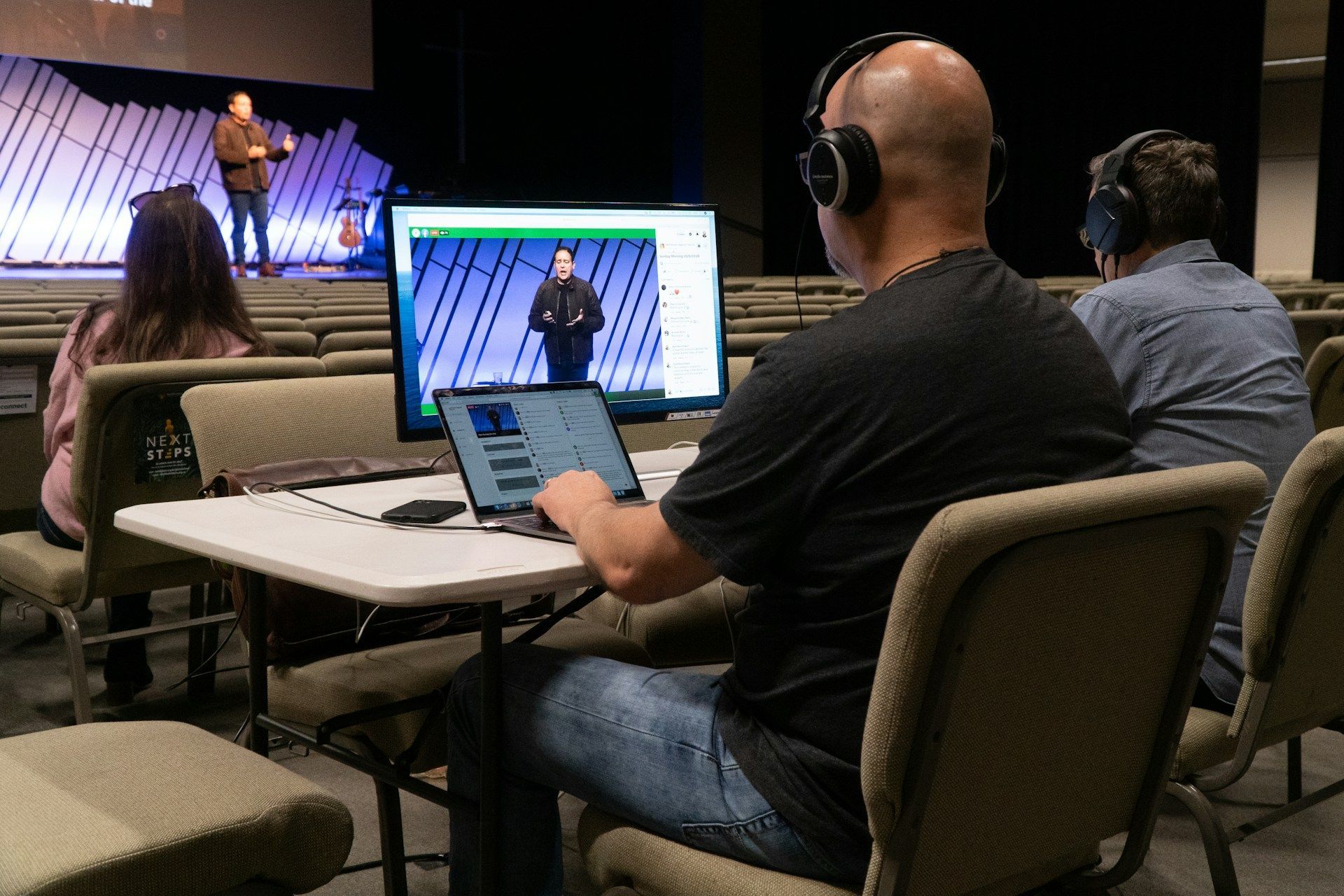"The Comeback Effect" with Jason Young
INTERVIEW REPLAY
TRANSCRIPT
Jono: All right. What's up everybody? It is time for our monthly live stream here at Faithworks Marketing, where we help Churches get their online presence as strong as it possibly could be to reach more people through their website, through social media, through search engine optimization, through Google ads and all that good stuff.
Jono: Today I am joined by the man, Mr. Jason Young, who is looking good. Jason, thanks for being here, man. I appreciate it.
Jason: Yeah. Thanks Jono.
Jono: We actually went to seminary together, so we've been connected for a minute. That makes man, we graduated in like, '06? Something like that.
Jason: I finished in 2000.
Jono: Oh, oh, I finished way, I'm smarter than you.
Jason: Well, you probably took all the advanced classes. So, you know, you stayed there a little bit longer. I did not. I took the easier ones so I could get out.
Jono: Yeah, yeah, yeah. Didn't do so hot in Hebrew. Didn't do too hot in Hebrew or Greek, or Spanish in high school for that matter.
Jono: I took an extra minute or two. But anyway, so Jason helps Churches and companies. I've got your bio here in front of me, which is really impressive.
Jason: Oh no.
Jono: So, I'll just share with everybody. So, Jason's worked with lots of Churches.
Jono: Now he's serving as an author, a consultant, a coach, a professor, a keynote speaker. He's done some doctoral work in the fields of hospitality and leadership trauma, which is interesting. He's got six books out and we're going to be talking about one of those today. The comeback effect and JC you're in Atlanta, where are you living these days?
Jason: On the east side of Atlanta, I'm like halfway between Atlanta and Athens. So just kind of nestled right there.
Jono: All right. Cool man. Well, dude, thanks again for joining us. We're streaming out here to literally dozens and dozens of people.
Jono: So anyway, man, this stuff is good. I love this and what I wanted our audience to get out of today is just, I think we've all got to be reminded to remember what it's like to be the new person I think that it is so easy to forget. I used to beat this drum when I was a youth pastor and a family pastor, I just reminded everybody like, look it is so easy to forget. You guys have been coming to this Church for 10 years and you have forgotten what it's like to be the new kid, and you forgot what it's like to have to come in and not know anyone. So, you're like reading the posters on the wall just to not feel awkward.
Jono: Man, I just, you know, beat that into their heads because I'm like, look, they're going to go somewhere else if they don't feel welcome and comfortable and they're scared out of their mind, if they're coming in here not knowing anybody. So, for me, I got that kind of honestly, because I grew up as a pale redheaded child with a mullet in rural Georgia. In fact, such a mullet that we ended up, my family kid you not, ended up on the cover of both the Awkward Family Photos 2021 calendar and the Awkward Family Photos card game. That's how big my mullet game was in the eighties, and so that did not come without some bullying and some bruises, you know, and some picking on.
Jono: So, you know, I went to the school of hard knocks, Jason.
Jason: I've seen that. Oh, yeah, straight up stud. That's straight up stud.
Jono: You can get your signed copy at Kohl's and other fine book sellers. So, for me it was kind of like the passion to make everybody feel comfortable was birthed out of me never feeling comfortable, and me just being this insecure little kid that didn't have a lot of friends and wanted somewhere to belong. I found a youth group when I was in high school, and these kids were nice to me and totally changed my life. Youth pastor was awesome. The students were nice to me. They, you know, brought me in and I finally had friends that I trusted and that stuck with me.
Jono: So that was my philosophy in youth ministry. I guess one of my questions was just going to be why did hospitality become such a big deal to you? Was it just always a big deal? Was it something from your family? Traumatic childhood experience like me getting picked on for a mullet, you know, where did this come from, man?
Jason: So, I didn't realize, my mom works in medicine and my dad has been in the automotive industry and in their own way, they've always prioritized people. So, one of the things I picked up, I didn't realize it over the years and into adulthood was the way that they spoke about patients, guests, customers, you know, was with this care and with this priority. And I guess I just picked up on it. So that's one piece. The other piece I've always kind of had this I don't know, affinity is not a good word. I always kind of had this bent to, to paying attention to experiences. I didn't know what I was doing at the time.
Jason: I was just very observant taking it all in formulating opinions. Well then kind of going into the Church world. I began to factor those into, you know, student ministries, where I started. And then, you know, I started getting more responsibilities and then eventually I got a role that was dedicated to creating experiences, you know, at a campus for 15,000 and, you know, and it just began to kind of snowball.
Jason: And the more I did it, the more I realized how impactful it is. And to your point, the more comfortable we make people feel the more likely they are to come back, which brings up an interesting thought. And you said this earlier, sometimes if we're not careful in our attempt to make people feel uncomfortable, because it's how we define being comfortable.
Jason: We actually make them feel uncomfortable. So, the word comfort, it's not up to me to decide what makes them feel comfortable. It is up to me to pay attention to what makes them feel comfortable and then adjust. So that's one thing. The second thing is on the comfort level. I think the further away we get from the first time we experienced something, the number and more immune and familiar we can be to that, you know, it's like last night there's a kid in our neighbourhood and where my son goes to school, this kid is starting.
Jason: So, it's his first day, first time at this school. And so, my son and I were talking last night, and I said, remember when you first started that school? And he's like, yeah. I said, do you remember what you were most nervous about? Yeah. What? You know, the friend part, what will people think?
Jason: You know, kind of da, da, da. I said, well, that's what he's thinking. I ran into him last night. He and his mom and my wife and I were walking. I said, that's what he's thinking and feeling too. So today when you see him, make sure that you see him not notice, but you see him, you speak to him, you invite him to sit with you at lunch.
Jason: I'm not asking you to be BFFs. But what I'm asking you to do is to just that initial, because guess what? Not only will he appreciate it, but his mom who's very nervous and anxious will also appreciate it. We have to pay attention to how people feel. And sometimes what we prioritize is how we feel or how we think they feel versus truly understanding how they feel.
Jason: So, all of, kind of my parents and experience kind of brings me up to current day of like, that's kind of how I got here and how I still think and feel about it. If that makes any sense.
Jono: That makes perfect sense. And that's good, man. You hit on something that I'd kind of highlighted in the book and I was going to get to it, but you mentioned it, so we'll go ahead, and I'm going to go ahead and ask you about it.
Jono: Because I just thought it was really good. It's in the chapter talking about knowing the guest. This is something that I've never heard anybody talk on except you. And I just think this is great. Cause it's been something that's always been in my head because Churches tend to, when they're developing a greeter team and given not every Church has a pastor of hospitality, we get that, you know, and then so at larger Churches, we see how it can be a little bit, you know, better and easier. because there may be a staff person that's their only job, but still in Churches, that don't have that position. They tend to just look for smiley, happy, outgoing people.
Jono: And a lot of times, maybe even to the level of like obnoxious and think oh, they're outgoing and smile and loud and, you know, hug. They'd be a great greeter. Let's put them at the front door. That's really cool for the other seven people that have that same personality, but then you got people like me, I don't want a hug.
Jono: I noticed that a lot of greeters who are just thrown there because they're outgoing and they're charismatic. Either don't have the ability or haven't been trained to pick up and read the cues of the person that they're greeting or talking to. And I think they end up making a lot of people uncomfortable.
Jono: And you talk about preparing for the different types of guests and that not everybody wants a hug. And so, what do you do though? What does the pastor do? What does the Church leader do? He's got a hard time getting volunteers anyway. He certainly doesn't have the time to do a psychological profile on every greeter and figure out, you know, you'd be better at the coffee bar.
Jono: So, what do you do? What advice do you have for them?
Jason: So, a couple things, one, you mentioned not, everybody's going to have this, you know, hospitality pastor, first impressions, guest experience director, whatever the title may be. I've heard Church say that. And here's the thing about it.
Jason: You can't use it as an excuse because really for hospitality to be effective, it has to be culture wide. So, if the pastor doesn't care about it, but you expect this one department to care about it and for it to be pervasive, it's not going to work. And so, it has to be like staff wide. It has to be, you know, senior pastor.
Jason: I'm not saying it has to be your number one thing, but it has to be a priority for you, and you have to talk about it and staff it and resource it and to the very best that you can. That's one thing. The second thing is we Churches aren't notorious for focusing on a person. We are notorious for focusing on every single person that we just want them to come here and then we treat them all the same.
Jason: Well, what we learned in the business world is when you have a target market or when you have a particular area, you know we're the Church and we're about Jesus and it's for everybody. And while that may be true, Jesus is for everybody.
Jason: Your Church is not, and there's going to be some people that feel like, you know what, this is for me. I remember one time we attended a Church and like some great things about it. And then when we got to, we realized, okay, this isn't a place for us, you know? And so, we found another place that was more for us.
Jason: And so sometimes just the way it is. So, you have to, one, hospitality, it's about the culture. Two, you have to make sure that you understand the guests that are coming in. Like, you know, I talk about this phrase, psychographic and businesses use this. In fact, there's a Church out west, in Arizona that does this really, really well.
Jason: They make decisions through the filter of our primary target. Well, sometimes it rubs people the wrong way, because except when you're alienating people and they're not, they're focusing on someone in order to get the rest. So, they're focusing on like a man or, and a father. Because they know that they can, you know, focus that gets family and kids and spouse, you know, things of that nature.
Jason: So, for them, that's their approach. So, they spend time understanding the guest. What does that do for you? Well, what that does is it is guided by this question. What's best for the guest? Not what's best for that volunteer. Not what's best for that team, like what's best for the guests? And so, when you ask that question, then you can staff these moments that you illustrated earlier accordingly. For example, one time I was secret shopping. They asked me, they wanted me to evaluate this, Church. I pulled up into the guest parking, which I rarely do, and no sooner had I opened my door, there was a volunteer standing there and it was like, whoa, bro. Like simmer down. This is a little bit much.
Jono: It's like, helping you unbuckle your seatbelt.
Jason: Help me tuck my shirt in. It was weird. No, I'm just kidding. I'm being dramatic, but it was a little much, and as excited as that person was, and I appreciate that. It's not what made me feel comfort. And so, I think it is helping to think through like, what do we need to do?
Jason: How do we throttle? And just because somebody is outgoing, doesn't mean they need to be the first face, or if they're outgoing, you know, this is where training and development is helpful. For me, training is in the first 90 days and development begins day 91. And so, we have to begin to ask ourselves, like, I don't want to hug everybody. I don't want to shake. Just think when I shake, when that volunteer shakes, my hands, all I can think about is the 699 other hands you just shook and then you shook mine. But for some Churches that's attention, because it's like, wow, we want them to feel welcome.
Jason: What does that even mean? Does a handshake equal welcome? Does a hug equal welcome? What about like words, eye, contact, body language, not talking to another volunteer, like those things communicate welcome too, but we don't seem to focus on those as much, you know? So, does that make sense?
Jono: Yeah. That's good.
Jono: So that's one of the other things that I thought was just really good. This goes along with what you were saying about culture that you've got to create a culture. It's not just having a hospitality team or a hospitality department. You've got to create that culture.
Jono: And you had said in the book, like you gave an example of a Church and the quote in there that just stuck out to me. It was just kind of a short little simple sentence, but it almost made me giggle because it said, the Church thought they were welcoming, and I'm like yeah, what Church doesn't think they're welcoming, honestly.
Jono: And I've been you know, I've guest spoke at some Churches. I've served at some Churches. I remember one of the first Churches I served at. I remember somebody standing up and of course I was a young, smart mouth then and saying, you know, we just have the most loving, welcoming Church and I'd be like, what Church are you talking about?
Jono: Because no, we are not, no one feels comfortable. People have been nice and welcoming to you, but you've been going here a hundred years but people who show up feel kind of stared at and don't feel like they fit in. But I don't know of any Church who would be like, you know, yeah, we're pretty rude.
Jono: We just don't care. So how do you create the culture? How do you convince, I mean, do you have to convince a Church maybe it's not necessary, but does a Church need to realize that they're really not that welcoming before they can start to become welcoming?
Jason: You know? I think sometimes we complicate this.
Jason: And think about places that, you know, if you're watching or listening today, like you like to shop at places that make you feel comfortable, that make you feel comfortable in a way that make you feel comfortable, not them. Right. And so, what does that look like? And I think in the Church when we think culturally, first of all, the pastor and the pastoral staff have to care and actually have to be hospitable to each other and to the staff.
Jason: And so, if you're not doing that internally, then you can forget it being sustained externally. You may get a few bumps, but you're not going to sustain a remarkable experience. So that's one thing. Like there has to be a care and sometimes it's, I've realized, some Churches think it's a DNA value, but it's really an aspirational value.
Jason: We want to be a caring place. We're not currently a caring place, even though we, we think we are. So sometimes it's just putting it on the radar. Sometimes it's a priority thing, but it's got to be practiced on the pastor, pastoral staff, staff level. And then it has to be demonstrated in front of, and to volunteers.
Jason: You know, the guest experience is simply an overflow of the volunteer experience. So, if you're trying to get a great guest experience without a great volunteer experience, you're going to struggle because great volunteer experience is simply flowing over and the guests experience what they experience with you, right?
Jason: Or the volunteers overflowing the guest experience is what the volunteers experience. So, it's kind of this cascading effect. It takes time. But it takes intentionality. And I write in there, intentionality is rarely convenient, but it's always meaningful to the other person. Right? And so, this is work that matters.
Jason: And so, you know, you have to think, all right, what does it look like for us to be hospitable to each other? You know, what does it look like for us to demonstrate hospitality to our volunteers? What does it look like for us to demonstrate hospitality to a guest. Here's what I'll say. Some people disagree with this.
Jason: Totally fine. The volunteer experience is more important than the guest experience. A lot of Churches I work with, they hire me to help with the guest experience. And in our exploration, we discover the volunteer experience is not very good and they are absolutely connected at the root.
Jason: So, culturally, the pastor, the pastoral staff, the staff have to care, and they have to demonstrate this to each other. They have to then demonstrate it to their volunteers who then demonstrate it to the guest, and it takes time, but it requires intentionality.
Jono: That's good. I would agree because it's going to trickle down from the top, I think you even mentioned that it's got to start at the top and of course, with most all of my experience is in youth ministry, but I think about different teenagers over the years who have gone off to serve at different summer camps.
Jono: They've gone to be leaders at different summer camps. And when you ask them how it's going, the ones that there's been some that are in these situations where they're getting them up at five, they're just working them, you know, and it's fine for them to work hard, but these kids are exhausted and they're not treated like they're just not really loved and encouraged.
Jono: They're just treated like workers and that's all they are. Then you ask them about camp and that's all they talk about is just how miserable they are and how, you know, hungry. They're not getting enough food, they're not getting enough sleep. And there's no way that those teenagers are ministering during the day to their small groups.
Jono: I mean, that stuff's pouring out. But then I know from other teenagers, they're off at some camps that I know those leaders they have, you know, a pastoral counsellor on staff. That's pouring into those other staffers and to their volunteers. And you know, I mean, you ask them about, hey, how's it going?
Jono: And they start telling you how awesome the worship is, how they're connecting with these students and stuff. And it's just night and day. And yeah, it totally began with how they're being treated at the top. And so, what about these situations where the pastor doesn't necessarily, he's not a hospitable guy?
Jono: This isn't important to him? It obviously needs to become important to them. So how does this change? They got to hire someone like you? Does the Lord just have to wake it up in their heart? Or can somebody else read this book and step in? You know, could a mid-level staff person lead the charge if the pastor's not on board?
Jason: Yeah, it'll never reach the apex without the pastor being engaged in it. However, it doesn't mean it can't still be impactful at your Church. So, if a staffer picks it up and staffer decides, you know, hey, in my area, this is what we're going to do. In fact, I'm talking to one staffer right now.
Jason: And this is a little bit of the challenge that the senior leadership, they got other things to do. And so, we're focusing on his particular area to make it a great example of what a volunteer experience and a guest experience should look like and then engage other staffers along the way. So, it's a slow go, but it's the best strategy versus well, if you're not going to do it, then we're not going to do it.
Jason: So instead of just throwing it out, you find and work where you can. I know it could feel discouraging if it's important to you, but it's not important to your pastor or your senior leadership team, but it doesn't mean don't do it because you could still have a great impact. And there are other staffers around you that may want to figure out how can I do that too?
Jason: So, you know, a lot of times we think of hospitality, well that's guest experience first impressions, you know, these different words, but we forget that this happens all throughout the Church. For example, if you're, you know, working with preschool, you know, hospitality to the child, hospitality to the parent, hospitality to the grandparent that are there with their kid that day or you know, you think about student ministry.
Jason: So, I mean like this is in many, many different places and remember this, great hospitality assumes great leadership. So, if I go somewhere and I have great experience, I assume, and I may do this subconsciously that somebody back there, a leader, somewhere back there, this matters to him or to her, and they are making this a focus.
Jason: Now the flip side's also true bad hospitality, poor hospitality assumes poor leadership. And so, when we think about our Churches, if we're not, we should be the most hospitable place around. I shouldn't even have to say that because when we think. Hospitality is really this meta-narrative in the Bible, really from Genesis to Revelation, we see God demonstrated to humanity.
Jason: We see humanity to humanity, really beginning with Abraham and Genesis 18. We see it throughout the New Testament. We just see it everywhere. We have to be the example of hospitality, right? So, in order to do that, don't wait on a pastor to pick it up. You as a staff person in your position, pick it up, do everything that you can, right?
Jason: And then maybe talk to other staff and see if there can be this, you know trickle effect and you can impact other areas, you know, as well. So hopefully that's helpful.
Jono: I'm thinking about like, okay, well why? Why is this such a big deal?
Jono: But I think it was Doug Fields. He was a youth pastor out at Saddleback. I think it was him who said this. Maybe not. And I'm sure other people have said it, or something along these lines. But he used to always, when I would hear him speak at different podcasts or whatever. He would say teenagers and people have to feel like they belong before they will believe.
Jono: Before they believe anything that's coming out of our mouth before they believe the truth that we're speaking to them. Before they'll believe the Bible that we're teaching them. They've got to feel like they belong, because if they're just nervous and uncomfortable and insecure and have a bad experience, they're not hearing a word that comes out of anybody's mouth.
Jono: They've got to feel like they belong before they'll believe a lot of times. And so, I think that's why this is huge.
Jason: Well, you know what, Jono, you brought up something. Sometimes we expect people to behave a certain way like us when they come and experience us.
Jason: Right? And so, when we go back to thinking about knowing the guests, and then what you just said about the belonging part, when we back up kind of from our staff roles, we have to ask the question, like, what does that even mean? Sometimes we just have to think about it personally, like, okay, when I want to belong to, or when I belong to, what does that mean?
Jason: I'm known, you know, or I'm not just noticed I'm seen, or I feel that someone cares about me You didn't ask this question, but this may help give context. For me, so much of this is not just based on biblical elements. It's actually based on brain elements. And if you're a staffer and Church volunteer, you're listening, one of the reasons this is really important and it's actually how God made the brain and it relates to belonging and how people feel remember this, that emotions drive people and people drive performance. When I say performance, I'm not saying you're performing on a stage for people to like to applaud, but you're doing things well, what drives that?
Jason: The person, what drives the person? Emotions. Well, how do we know that? Well, when you look at a profile of the brain, in the middle of the brain is that limbic system. Right? And that's where all emotions are housed. Well, the front of the brain is this prefrontal cortex where rationale logic is happening.
Jason: Well, if there's a stimulus. So, it comes into the nervous system, spinal cord, it hits the limbic system first. So, we may or may not ever get whatever just happened to the front of our brain to actually logically think about it. So, when people come and experience your Church, they feel first. That's why emotions drive people. It's just the way the brain is made and you're not going to change that. It's just how God made the brain.
Jason: So, when we think about creating these experiences, that's why, when we think about the guest, we have to remember how does a guest feel? You know, when they come up, they are making a brain decision. I hear Churches a lot say, well, we're going to speak to the heart of people. I'm like, cool. How do you do that?
Jason: Well, you know, we just, we speak to the heart. I'm like, well, people are making decisions with their brain and primarily the limbic system, because it's where emotions are out. And here's the other small little part, in the limbic system, and you probably know this, and your listeners probably know this, there's a almond shaped part of the brain called the Amygdala and the Amygdala does one primary thing and it scans for threats. Am I safe here? Am I mentally and emotionally safe here? Do you see me? Do you care about me? Are you there for me, et cetera. When people come and experience our Church, when a volunteer joins our team, that Amygdala is scanning for threats, we all do it with each other.
Jason: And if they don't feel safe, I'm out. Right? That's where we get our fight, flight and freeze, you know? That language comes from. So, when we put these experiences together, we have to think through, that's why emotions are really, really powerful because it is driving that person. And so, it's not something we argue with.
Jason: It's how God made the brain. So, what we do is we build these experiences to incorporate how the brain is wired and to speak to it. That's why these basic things, I see you, I'm listening to, I validate the fact that it is nerve-wracking to come here today or, you know, whatever it may be, because what you're doing is you're speaking to that Amygdala and you're speaking to the limbic system and you're allowing that brain to say, you're okay here.
Jason: And whenever people feel like they're okay somewhere, that's the place they want to come back and if they aren't okay or they don't feel okay there, they don't want to come back. That's why, you know, I think about Publix and their tagline where shopping is a pleasure. They're focusing on an emotion when you're there, it is a joy to be here. Why?
Jason: They've built this system. Are they perfect? No. But they built this system to try to figure out how do we help people feel when they're here, they have feelings already, but how do we tap into that and highlight the fact that we see it and we're focused.
Jono: So what are some of the things big and small that you've done or that you've seen others do well that you think are major contributing factors and, you know, big stuff could be, music or whatever, and even down to the little stuff, like you mentioned in the books, there's a couple times in here, you talk about mints.
Jono: You talk about mints a lot. Mints are obviously very important, but I thought it was interesting because you switch the mint flavour and you guys start going through, you know, exponentially more mints than you had been going through. And so anyway I thought that was really cool.
Jason: Well, one, we talked about the biggest the pieces, the cultural element that takes time effort.
Jason: I just want to say that is huge, but there are a lot of other little things, like, for example, what are the scenes or the moments that a guest passes through at your Church? And so, figuring that out, answers a couple questions. One, where do I need to place volunteers? Two, what type of volunteer do I need to place in that particular area?
Jason: Funny when you do these kind of exercises, you might realize I don't need\ as many volunteers. I need to put different volunteers in those particular places than I thought. And three, it really allows the guests to like, you have built something for me. So, I think that's one thing, like what are all the little moments in the guest experience kind of like in and out street to seat and seek the street, right.
Jason: That's important. And then that didn't even include the web and social, you know, all that world. Placing people appropriately, the types of people, how you train them. There are some peculiar volunteers. Let's just get that out of the way. And so, you have to kind of work with that and work around that.
Jason: And it's like, oh, I feel the Lord calling you to be in the basement where one person comes in, the week, you know, I feel like the Lord's just doing that. So, I think that's a thing. I think you demonstrating all of this to the volunteer and really making sure that the volunteer experience is absolutely remarkable.
Jason: So, if you want them to feel seen and cared for and valued, validated. You know, you cannot expect them to replicate what they don't experience with you. They literally do what they experience with you. The other thing is just constantly celebrating when you see something good happen. Man, I saw Jono, I saw him take a guest and walk them from, you know, here to, you know what that does.
Jason: That removes a feeling that the guest might have to feel nervous and anxious, because they don't know where they're going. You remove that feeling and you replaced it with, I got you and you know what, that's why we're here. So, it's paying attention and celebrating those things because people go, oh, that's what we're supposed to do.
Jason: Like I can do that versus you telling people, you know, there's kind of that thing. So those would just be. I mean super quick things, you know, and working with Churches. I see some do it really, really well. And I see some do it poorly. Maybe the other thing I'll add and then I'll be quiet is sometimes we live hurried moments and a guest, just assume that their life is hurried.
Jason: What if you were the volunteer, the staffer that in the one moment in the week. You gave them the gift of an unhurried moment. Now, that creates a feeling in somebody that people want to come back and experience again, because you gave them calm, and you gave them an unhurried moment that they hadn't had all week in their hurried lives.
Jason: And so that could be really powerful again, it's speaking to the mind that emotion part of the brain to say, hey, I got you. I'm here for you.
Jono: That's good stuff. That's a lot to think about. I wish I'd had this book at the beginning of my youth ministry days, but man, I'm glad it's here now.
Jono: If you haven't read this book, everybody, you need to get this book. We'll post the link to the Amazon along with Jason's other books. There's the Comeback Culture which is for business and organization leaders so if you're not a Church leader, that one may be a better fit for you.
Jono: But man, this has been great. There's a lot of good stuff in that we've said that or that you've said that I think our audience can totally take back and put into place and evaluate. I think every Church should hire the secret shopper thing, that's a great idea.
Jono: In fact, I would love to be a secret shopper at a Church. I'm super critical and cynical. That would be bright up my alley.
Jason: Yeah, it is fun. And I'll say this, Jono, on the book side of things, I'm not good at like promoting books. We've talked about the guest experience and the volunteer experience.
Jason: There's a book I have called the Volunteer Effect. I actually pitched the kind of title to go along with this as a joke to the publisher. And they're like, that's it? And I'm like, oh, okay, that was kind of a joke. But the Comeback is for the guest experience and the Volunteer Effect is for the volunteer experience.
Jason: So, if you're trying to figure out how to do both of those, there's a book, a plan to help you with them.
Jono: Sweet. Well, I need to read that and then get you back on here to talk about that one. I'm excited about that, man. Let's do it. All right. Well, man, thank you so much for being with me today.
Jono: Thanks everybody, who's watched on YouTube and Twitter and wherever else, Facebook, Instagram, the podcast. Thanks everybody for being here.












